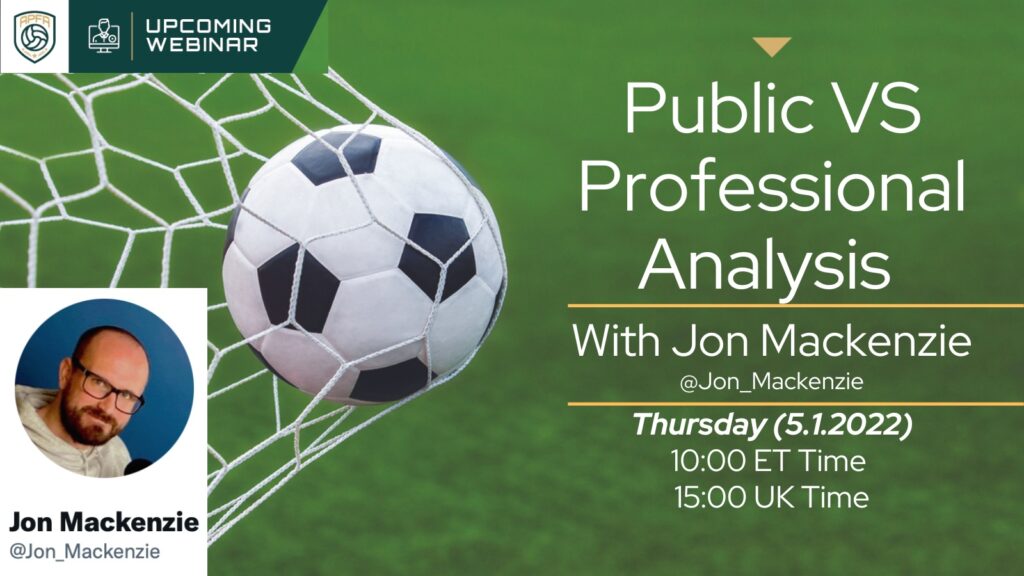The differences between professional analysis that takes place at clubs and public analysis that takes place online or in the media can seem vast. But it is also a pipeline that many people look to pursue, as they use public forums in order to try and get noticed by clubs.
There have been concerns that the nature of some analysis which takes place publicly can invalidate the complexity of the analytics profession. That is why we brought Jon Mackenzie, an analyst for Tifo and The Athletic, and the APFA’s Oliver Gage together to discuss what professional analysis and public analysis can learn from each other, and how they can improve the industry in general.
Always think about your audience
Regardless of who you are producing analysis for, considering your audience is always crucial says Jon Mackenzie.
“When you think about what the audience is for your analysis, it changes the way that the analysis takes shape.”
“What are my intentions in terms of transmitting knowledge to this audience?”
A key part of understanding your audience is storytelling. Regardless of whether you are putting out your analysis for a public audience or one in a professional context, you want to bring people along.
“There’s a lot [professional] analysts can learn from people who are working in the entertainment industry,” says Mackenzie. “In terms of being able to engage people, being able to transmit knowledge, transmit ideas, learn about education techniques.”
“There is plenty of people I can watch on YouTube, on Twitch, and all of these sorts of video outlets, who will teach me to be a much better presenter, a much better communicator.”
“It is important that you can communicate, you can recognise your audience, you can understand what it is that you need to tell them to get them on board.”
How can public analysts improve?
“Analysis is meant to be a detailed breakdown of something complex,” explains Oliver Gage.
The problem that has been identified is the tendency for people on social media to focus on building scatterplots, for example, rather than really diving into the reasons behind the way teams or players perform.
“Clubs don’t want information that’s easy to get ahold of,” agrees Mackenzie. “They want the periphery stuff that no one else is thinking of, which gives you the edge.”
“The temptation is always to make stuff public, so that you get seen. But the temptation is also to put stuff out there too early, before you are at a point where you are going to do anything outstanding.”
To improve the depth of your analysis, Oliver Gage recommends asking yourself questions like: What now? What does this mean?
“A lot of people can say ‘this is what just happened’, but to say ‘and this is what we take away from it’ – that is the big thing missing, in my opinion, from a lot of public analysis.”
Building your niche
The webinar also raised concerns that analysts within the public space try and cover too much.
“If you just try and do everything, I think you are going to fail,” says Gage. “You’re going to end up doing nothing well enough and you’re not going to hit a niche for anybody.”
The example of set piece analysts is instructive here. Most of the people who began specialising in set pieces a couple of years ago are now employed by clubs, because they were ahead of the curve and so had first-mover advantage.
Jon Mackenzie also talked about how his focus around Marcelo Bielsa during his time at Leeds United allowed him to develop his specialism in out of possession systems.
“That’s just one niche I arrived at completely by chance. But I recognised there was no one covering it and was able to use the expertise I picked up to fill it.”
If in doubt, watch more football
Everyone is looking to improve their skills in analysis, but there is no quick fix.
“My primary advice to anyone wanting to go into performance analysis, particularly tactical analysis, is just watch more tape,” says Mackenzie.
“Having one manager who you get to know really, really intimately in that is really helpful. It gives you a framework to differentiate when it comes to other managers.”
“Always try and watch tape for the managers that people are saying are interesting. Don’t just go and read the article. Go get the tape, watch the tape, and make your mind up for yourself.”
“If you want to get good at this stuff, it takes time, it takes effort. It is a huge amount of football watching.”
To watch the full webinar, you can register now as a premium member of the APFA.










